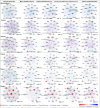Dietary habits and complex food relations in Northwest China: a population-based network analysis
- PMID: 40771505
- PMCID: PMC12322544
- DOI: 10.1136/bmjnph-2024-001153
Dietary habits and complex food relations in Northwest China: a population-based network analysis
Abstract
Introduction: This study examines dietary network in Northwest China, focusing on food group consumption and regional trends using network analysis.
Methods: Data from 106 424 participants in the Regional Ethnic Cohort Study were calculated using a semiquantitative food frequency questionnaire. We compared intake with the 2022 Chinese Dietary Guidelines and employed the EBICglasso method to construct dietary and staple food-related network, assessing its stability and accuracy.
Results: Northwest China's staple food intake was 37.5% of total consumption, dominated by wheat. Compared with the Chinese dietary guidelines, participants' intake of staple foods, soybeans and nuts was within the acceptable range, with insufficient intake of whole grains and beans, animal source of foods, eggs, fruits and vegetables but excessive intake of salt. Intake varied by province, sex and age. In overall participants, the strongest correlations were found between the two food groups, namely fruits and vegetables (0.33), and animal source of foods and dairy products (0.24) in dietary network. Soybeans and nuts appeared to connect to more other foods and also higher correlation with other foods and were followed by animal source of food. The staple food-related food network indicated that the intake of rice, whole grains and beans, and potatoes was positively correlated with the intake of most other foods, while intake of wheat was negatively correlated with foods of animal source of food, milk and dairy products.
Conclusions: Northwest China's diet exhibits irrational patterns, highlighting the importance of assessing overall dietary patterns in nutritional evaluation.
Keywords: Dietary patterns; Nutrient deficiencies; Nutrition assessment.
Copyright © Author(s) (or their employer(s)) 2025. Re-use permitted under CC BY-NC. No commercial re-use. See rights and permissions. Published by BMJ Group.
Conflict of interest statement
None Declared.
Figures





References
-
- Ma G. Food, eating behavior, and culture in Chinese society. Journal of Ethnic Foods. 2015;2:195–9. doi: 10.1016/j.jef.2015.11.004. - DOI
LinkOut - more resources
Full Text Sources
